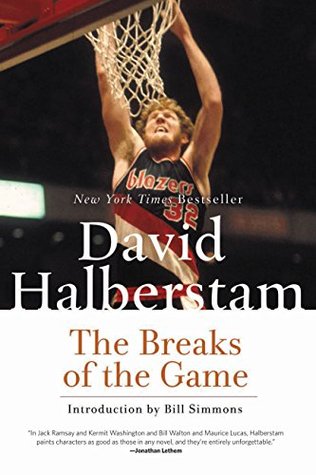More on this book
Community
Kindle Notes & Highlights
If professional basketball moved into a city which was not ready for it, New Orleans, for example,
Colin Loberg liked this
The players, locked into an endless schedule of eighty-two regular-season games, a schedule which guaranteed a kind of constant fatigue and almost certain minor—if not major—injuries, now faced even greater travel burdens and still more fatigue.
What had happened to basketball was typical of altogether too much happening in the new American scheme of things: there was more, but it was less.
For basketball demanded that though the players be talented, they also subordinate their individual talents to the idea of team and to each other. A truly great basketball player was not necessarily someone who scored a lot of points; a truly great basketball player was someone of exceptional talent and self-discipline who could make his teammates better. Basketball was a sport where under optimal conditions a great player with considerable ego disciplined himself and became unselfish.
He did this because he believed that there were only three times when a player had any real leverage in the sport. The first was when he first came in the league, and he, Maurice Lucas, had blown that. Second, when a player became a free agent, and he had blown that too, signing at the beginning such a long contract that the only way he could get a commensurate NBA salary was to extend the contract even further, which made his free agency a distant question. And third, when a player was traded and a new team was anxious to keep him happy and thus meet his demands.
If he’s behind eight points with ten seconds to play, Jack is there on the bench figuring out a nine-point play.”
Ten years earlier most members of a team smoked; now almost no one smoked (Tom Meschery as assistant coach had, when he visited Bill Walton at his home, felt terribly embarrassed about bringing in his pack of cigarettes; he had felt as though he were toting some kind of pistol). They might smoke some dope later; it was a relaxant, it was said not to hurt your condition. There were some of them, the wealthier ones, who used cocaine (that was a great league concern), though this Portland team was squarer than most and its use of drugs was thought to be marginal.
He was held, fouled and elbowed more than any other player in the league, all with the semitacit approval of the referees; for in truth, if they did not allow his opponents some small advantage there would be no way of stopping him. It was, in a way, the highest compliment that could be paid a professional athlete, the fact that they adapted the rules to limit his dominance,
(for it was said that in Philadelphia the baseball fans would boo the Easter bunny, and the basketball fans would boo Santa Claus).
We’re in the locker room, the game is about to begin, and who comes in with the biggest pimp’s hat you ever saw, a mink coat that must have cost $10,000 and underneath that, his basketball uniform? Marvin! He’s eating a Big Mac and stuffing fries down his throat. ‘Have no fear,’ he said, ‘News is here.’ That night he goes out and scores maybe forty-nine points and gets maybe twenty-five rebounds.
players. In part it was a reflection of the fact that the owners thought the athletes were stupid, but it was also a feeling that they should be eternally grateful for the chance to play a little boy’s game and be paid for it.


